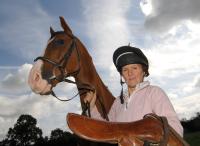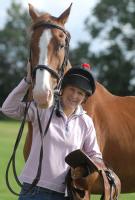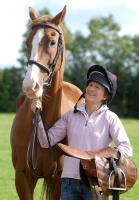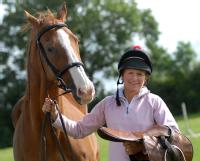Research & new degree to help thousands who fail to fulfil dreams of becoming jockeys
 A University of Warwick researcher's examination of careers and training in the horse racing industry has uncovered a significant wastage of talent as thousands fail to reach their dream goal of being a jockey. Her research has contributed to the creation of a new foundation degree programme to broaden the career options for those entering an apprenticeship in horse racing and to increase the appeal of horse racing as a career.
A University of Warwick researcher's examination of careers and training in the horse racing industry has uncovered a significant wastage of talent as thousands fail to reach their dream goal of being a jockey. Her research has contributed to the creation of a new foundation degree programme to broaden the career options for those entering an apprenticeship in horse racing and to increase the appeal of horse racing as a career.
Deborah Butler is conducting her research on the horse racing industry as part of her PhD thesis at The University of Warwick's Department of Sociology. She is also a tutor at Warwickshire College in the equine department at Warwickshire College's Moreton Morrell Centre.
Her research is uncovering a worrying decline in the numbers of people willing to work in the racing industry. This is partly because of the high drop out rates from the industry as people fail to fulfil their dreams of becoming a jockey. Around 1000 young people a year enter the industry but only 20 or so ever rise to become professional jockeys. However there are many other factors of modern living that are also deterring people from a career in the industry. Deborah Butler says:
"The horseracing industry is very labour intensive with technological developments of little use in reducing the size of the workforce needed. As such the industry is heavily reliant on its staff in order to meet and maintain its main aim of racing horses. This once ready supply of potential staff has been gradually contracting due to low levels of unemployment, the urbanisation of society, the trend for young people to stay on in further education, the younger generation's increasing body size and their unfamiliarity with the very physical nature of stable and stud work."
Her research also notes that the horse racing industry is becoming increasingly reliant on a high proportion of migrant labour especially in the larger training centres of Lambourn and Newmarket.
Since the nineties most of the employees that work in the horseracing industry are registered on the modern apprenticeship training scheme that forms part of the mandatory training that is delivered at one of the two specialist training providers, the British Racing School or the Northern Racing College. While this has had some positive impacts in that it brings much needed funding in to support training in the industry and provides the trainees with some of the knowledge and skills they will require to pursue their career goals, Deborah Butler feels that this framework still does not address the high drop out rates from the industry and the lack of any other career goals after achieving their modern apprenticeship.
This research at the University of Warwick has led Deborah, in conjunction with the British Racing School and her teaching colleagues in Warwickshire College, to create a new foundation degree at Warwickshire College known as the FdA Horseracing Industry (Business, Management and Practice) specifically designed for the horseracing industry. The Foundation degree is designed to be studied by distance learning by people working within the industry once they have achieved their advanced modern apprenticeship so giving them the skills required to fill a management role within horse racing rather than simply aiming to be a jockey. The new degree is being tested out this year with a pilot programme that began in September with four students.
University of Warwick researcher Deborah Butler said. "This will meet a real need within the industry and give those working in it a new career path to aspire to from almost the very beginning of their training. Race courses across the land, for example, are increasingly realising that they can't just rely on a couple of dozen race meetings a year. They are branching out into everything from car boot sales to classic car events to fill that "dead" time and they require race course managers and staff who understand both the needs of horse racing in particular and those of the leisure industry more generally."
Note for editors: Two of the four students are available for interview and can be contacted via Peter Dunn details below.
For further information please contact:
Deborah Butler: Her home and mobile number available to press only from Peter Dunn below
Email: Deborah.butler@warwick.ac.uk
Peter Dunn, Press and Media Relations Manager University of Warwick
Tel: 024 76 523708 mobile 07767 655860 p.j.dunn@warwick.ac.uk
Julie Chamberlain
Warwickshire College Press Office
Tel: 01926 884814
jchamberlain@warkscol.ac.uk
PR68 PJD 29th September 2008



